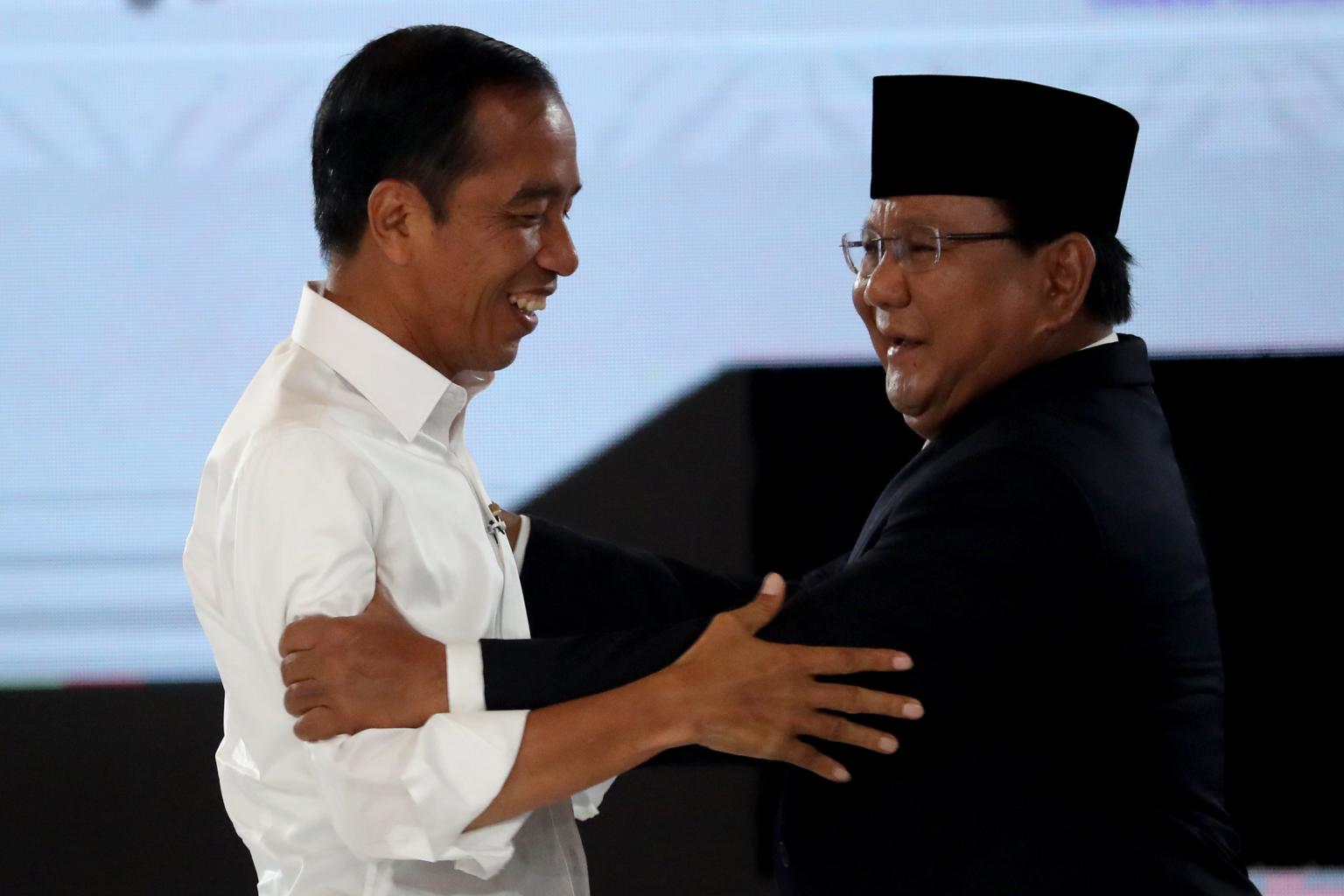Final Indonesia presidential debate to see taxation take centrestage
Sign up now: Get insights on Asia's fast-moving developments

Incumbent President Joko Widodo (left) and presidential hopeful Prabowo Subianto will likely use most of the last debate to unveil their vision on how to use taxes for the maximum benefit of the people.
PHOTO: EPA-EFE
Follow topic:
JAKARTA (THE JAKARTA POST/ASIA NEWS NETWORK) - Taxation is expected to be one of the topics that could take centre stage in the final Indonesia presidential election debate on Saturday (April 13).
Among the expected issues to be raised during the fifth and last round of the presidential debates could be the separation of the Taxation Directorate General from the Finance Ministry.
Incumbent President Joko "Jokowi" Widodo and his running mate Ma'ruf Amin, as well as presidential hopeful Prabowo Subianto and his partner Sandiaga Uno, will likely use most of the last debate to unveil their vision on how to use taxes for the maximum benefit of the people.
During the debate on Saturday, the presidential and vice-presidential candidates are to put forward their views on the economy, social welfare, finance, investment and industry.
At a recent campaign event in West Kalimantan, Sandiaga promised to separate the Taxation Directorate General from the Finance Ministry once elected to drive up state income from taxation.
"We will establish a special institution that will report directly to the president to increase state revenue," said Sandiaga as quoted by kompas.com, expressing hope that such a move would improve the tax to GDP ratio.
Sandiaga was highlighting the long-promised plan to establish a special taxation body similar to the United States' Internal Revenue Service, which is expected to bring greater flexibility and autonomy for the new body to chase recalcitrant taxpayers.
The establishment of a special tax institution with equal standing to the Finance Ministry was among the central issues being deliberated in the revision of the General Taxation System Law, which has been sitting with the House of Representative's National Legislative Programme since 2015.
The separation of the Taxation Directorate General from the Finance Ministry was among President Joko's campaign promises in 2014 and was included in his campaign's Nawa Cita (nine-point development program), said Jokowi-Ma'ruf campaign team spokesman Mukhamad Misbakhun.
Misbakhun said the relationship between the two institutions would remain strong despite the tax office's proposed elevation from the current directorate general level.
"Obviously there would be a strong relationship between the new (taxation) body and the Finance Ministry as the latter acts as state treasurer," said Misbakhun. "The revenue collected by the new taxation body would be directly deposited into the state treasury account overseen by the Finance Ministry."
Misbakhun argued that elevating the status of the Taxation Directorate General would allow greater flexibility for the body in several key areas, such as in tax collection and administration as well as mobilisation and recruitment of its workforce.
Campaign team member for the Prabowo-Sandi ticket Harryadin Mahardika said separately that the upgrade in status to a special taxation body would mean the body could quickly adjust its resources to better respond to the challenges of tax collection.
"The problem now is the lack of tax officials. The ratio between officials and the general population is low," said Harryadin.
He said ideally the number of tax officials could double to 90,000. More tax officials would help the authorities widen the tax base, as opposed to collecting from a narrow tax base colloquially known as "hunting in the zoo", said Harryadin.
The establishment of a new taxation body will be complemented by Prabowo-Sandiaga's promise to lower income taxes to between 7 and 8 per cent, Harryadin added.
He also gave assurances that the establishment of a new taxation body would not translate into more bureaucratic hassles for business. "The separation (of the Taxation Directorate General from the Finance Ministry) will serve business interests as it will guarantee better services for taxpayers," said Harryadin.
However, Indonesian Employers Association chairman Hariyadi Sukamdani disagreed, arguing that the establishment of a new taxation body as an entity independent from the Finance Ministry would add another bureaucratic layer that businesses would have to deal with.
He instead argued that the current institutional format worked well for business. "It's already proven that under (Finance Minister) Sri Mulyani Indrawati customs and tax authorities could be synergised," he said. "If a new body will be established, it may complicate matters."
Managing partner of the Danny Darussalam Tax Centre , Darussalam, said the separation of the taxation office from the Finance Ministry would allow greater discretion of the body over its organisation, human resources and budgetary needs.
He added that the establishment of a new taxation body would reflect its important status in collecting the majority of revenue for the state's coffers.
In the 2019 state budget, the tax office was expected to collect 1.78 quadrillion rupiah (S$170.2 billion) in taxes, or 72.5 percent of state revenue.

